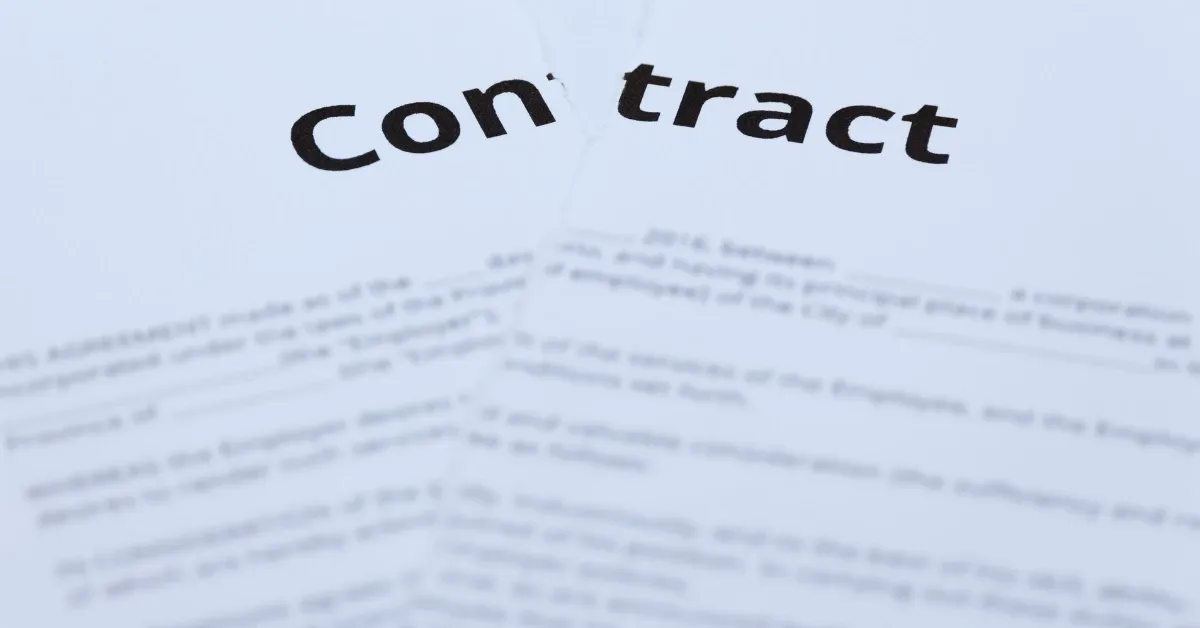When is a Landlord in Breach of Contract? Rental Awareness
A landlord is in breach of contract if they fail to fulfil any agreed-upon responsibilities outlined in the lease agreement. A breach of contract can occur if the landlord fails to make necessary repairs, violates privacy rights, or fails to provide a safe living environment for the tenant.
If you believe your landlord is in breach of contract, you may have legal recourse, such as filing a complaint with the appropriate regulatory agency or taking legal action.
In this article, we will explore what constitutes a breach of contract by a landlord, how it can be identified, and what actions a tenant can take to address the situation.

What Is Breach Of Contract?
When a landlord agrees to rent out their property, they sign a contract with their tenant. This contract sets out what is expected of both parties and what they can and cannot do.

However, sometimes landlords may fail to fulfil their contractual obligations, resulting in a breach of contract.
Let’s explore the meaning of breach of contract and its key elements.
Definition Of Breach Of Contract
A breach of contract occurs when a party fails to fulfil its obligations as outlined in a contract.
In the context of landlord-tenant relationships, a landlord may breach a contract by:
- Failing to make necessary repairs to the property.
- Failing to maintain a safe living environment.
- Failing to provide essential services such as heating or hot water.
- Entering the property without the tenant’s consent.
- Refusing to return a tenant’s security deposit.
Elements Of Breach Of Contract
To determine whether a landlord has breached a contract, several elements must be present. These include:
- The existence of a valid contract between the landlord and the tenant.
- The landlord’s failure to perform their obligations as outlined in the contract.
- The tenant must be able to prove that they have suffered damages as a result of the landlord’s breach.
- The breach must not have been caused by the tenant.
It’s worth noting that not all breaches of contract are equal. Some may have a minor impact on the tenant, while others may have more severe consequences.
In any case, breaches of contract should be taken seriously and resolved promptly to avoid further legal complications.
Types Of Breach Of Contract For Landlords
When landlords and tenants enter a rental agreement, they are both entering into a contract.
A breach of contract occurs when one party fails to uphold their end of the bargain. If landlords breach their contract terms, tenants have the right to take legal action.
There are various types of breach of contract for landlords, including:
Minor Vs. Material Breach Of Contract
- A minor breach of contract occurs when the landlord violates a small part of the rental agreement that does not significantly affect the tenant. This type of breach of contract does not usually lead to legal action.
- In contrast, a material breach of contract occurs when the landlord fails to fulfil an essential part of the rental agreement that substantially affects the tenant. This type of breach of contract may lead to a lawsuit, and the tenant may even get compensation.
Anticipatory Breach Of Contract
Anticipatory breach of contract occurs when a landlord indicates that they will not fulfil the agreement’s terms before the lease period ends.
For example, suppose a landlord tells a tenant that they plan to raise their rent before the increase takes effect.
In that case, the landlord commits an anticipatory breach of contract. This type of breach allows tenants to terminate their rental agreement early without penalty.
Actual Vs. Constructive Breach Of Contract
- An actual breach of contract occurs when the landlord fails to fulfil their obligation under the rental agreement. This type of breach is more severe than a minor breach of contract.
- Constructive breach of contract happens when the landlord’s actions or lack of action make it impossible for the tenant to stay in the rental property. Examples of constructive breach of contract include failing to make necessary repairs, violating the tenant’s privacy, or not providing essential services like electricity or water.
Common Landlord Breach Of Contract Scenarios
As a tenant renting from a landlord, you have the right to live in a safe, habitable space that meets certain standards.
Landlords are legally obligated to provide you with a home that is fit for living, and if they fail to do so, they may be in breach of the contract.
Here are some common scenarios where a landlord can breach a tenant contract:
Failure To Provide Habitable Space
- Failure to provide clean and safe common areas, such as hallways and stairs.
- Failure to provide adequate water, heating, and electricity.
- Failure to maintain working plumbing and ventilation systems.
- Failure to control pest infestations, such as rats or bedbugs.
Failure To Make Repairs In A Timely Manner
- Failure to fix leaks or make necessary repairs to the property.
- Failure to replace broken appliances, such as stoves or refrigerators.
- Failure to fix damages caused by natural disasters, such as floods or storms.
Misuse Of Security Deposit
- Landlords cannot use a tenant’s security deposit to pay for normal wear and tear of the property.
- Landlords must allow tenants to inspect the property before vacating to dispute any claims for damages.
- Landlords must return the security deposit within a reasonable time frame, usually within 21-30 days after the tenant has vacated the property.
Remember, as a tenant, you have rights and protections under your lease agreement and state laws.
If your landlord is in breach of contract, you have the right to take legal action to recover your losses.
Always keep written records of all communication and documentation to protect yourself in case of a dispute.
Tenant’S Remedies For Breach Of Contract

When Is A Landlord In Breach Of Contract?
As a tenant, knowing when your landlord is in breach of contract can be crucial information.
A breach of the lease agreement can go beyond simply causing inconvenience and can impact your living situation.
In case of such a situation, tenants need to be aware of their options and the remedies that are available to them.
Let’s discuss the tenant’s remedies for breach of contract with a focus on three key options: terminating the lease agreement, rent reduction or abatement, and property damage compensation.
Termination Of The Lease Agreement
A lease agreement is a contract between a landlord and a tenant.
When a landlord breaches a lease agreement, the tenant may have the right to terminate the lease before its expiration date.
Some common circumstances that may result in the termination of the lease agreement include:
- Failure to provide essential services like electricity, hot water, and heating.
- Refusal to undertake necessary repairs that affect the tenant’s health and safety.
- A violation of the tenant’s right to quiet enjoyment of the property.
- An attempt by the landlord to evict the tenant without a court order.
If you feel that your landlord has breached the lease agreement, the first step is to consult the contract.
The lease will likely outline the conditions under which the tenant can terminate the lease agreement.
If you decide to terminate the contract, make sure you do so in writing and keep a copy of the notice for your records.
Rent Reduction Or Abatement
When a landlord fails to provide essential services or repairs, the tenant may be entitled to a rent reduction or abatement.
This means that the tenant can pay less rent until the landlord has fulfilled their obligations.
The specific circumstances under which rent reduction or abatement may be granted vary between states and territories in Australia.
However, some examples of situations that could warrant a rent reduction or abatement include:
- A water leak that results in water damage.
- An infestation of pests like cockroaches or rodents.
- A lack of heating during the winter months.
- A malfunctioning elevator.
To request a rent reduction or abatement, the tenant will need to provide written notice to the landlord and outline the reasons for the request.
The notice should also include the proposed reduction in the rent amount. If the landlord contests the request, the tenant may need to take the matter to a tribunal or court.
Property Damage Compensation
If a landlord has breached the lease agreement, and as a result, the tenant has suffered property damage, the tenant may be entitled to compensation.
For instance, if a landlord fails to repair a leaky roof, and the water causes damage to the tenant’s furniture, the landlord may be liable for the cost of replacing or repairing the items.
The process for seeking compensation for property damage caused by a landlord’s breach of the lease agreement can vary depending on the circumstances.
In general, the tenant will need to provide written evidence of the damage caused by the landlord’s breach.
If the landlord disputes the claim, the tenant may need to take the matter to a tribunal or court.
It’s important for tenants to understand their options when dealing with a landlord breach of contract.
If a landlord has breached the lease agreement, the tenant may have the right to terminate the contract, seek a rent reduction or abatement, or claim compensation for property damage.
However, the process for pursuing these remedies can be complicated, so tenants should seek legal advice before taking any action.
Landlord’S Liability For Breach Of Contract
Renting a property can be a good source of income for landlords, but it must abide by legal requirements and contractual obligations.

Tenants also count on having a safe and habitable living space. If the landlord fails to comply with their responsibilities, they might be in breach of contract.
Contractual And Statutory Damages
When a landlord breaches a tenancy agreement, they could face damages either by contract or by statute.
The terms of the tenancy agreement will determine the contractual damages.
This could involve penalties written in the agreement, such as late rental payments or failing to carry out repairs.
On the other hand, statutory damages compensate tenants because the landlord failed to comply with their legal obligations.
This could include failure to provide basic utilities like water, or guaranteeing the safety of the property.
- Tenancy agreement determines contractual damages.
- Penalties may be written in the agreement.
- Statutory damages compensate tenants for legal breaches.
- Compensation may include basic utilities and property safety.
Potential Legal Consequences
When landlords breach their obligations, there could be legal consequences.
In some cases, tenants may take legal action against their landlords and seek compensation for losses due to the breach.
In other cases, the landlord may face civil penalties or fines.
The consequences will depend on the severity of the breach, the agreement’s terms, and the legal framework.
- Legal consequences can arise from landlord breaches.
- Tenants may take legal action against landlords.
- Landlords may face civil penalties/fines.
- Severity, agreement terms, and legal framework affect consequences.
Impact On Landlord’S Reputation
Breach of contract could negatively impact the landlord’s reputation. Good landlords are desirable, and tenants seek a comfortable living space with a responsible landlord.
If a landlord develops a reputation for being unreliable, unethical, or irresponsible, they might struggle to attract tenants in the future.
Additionally, having a poor reputation could make it difficult to secure loans or business partnerships.
- Breach of contract could tarnish the landlord’s reputation.
- Tenants desire responsible landlords.
- An unreliable, unethical, or irresponsible reputation can hurt future tenant attraction.
- Poor reputation may hinder securing loans or business partnerships.
Landlords must comply with their legal obligations and contractual agreements to avoid being in breach of contract.
Failure to do so could lead to damages, legal consequences, and damage to the landlord’s reputation.
Landlords should prioritize providing safe and habitable living spaces and keeping tenants happy to avoid breaching their obligations.
Frequently Asked Questions Of When Is A Landlord In Breach Of Contract
When Is A Landlord In Breach Of Contract?
A landlord is in breach of contract if they fail to fulfil their obligations outlined in the tenancy agreement.
What Are Some Common Breaches Of Contract By Landlords?
Some common breaches of contract by landlords include failure to make repairs, illegal entry to the rental property, and violation of privacy.
Can A Tenant Sue A Landlord For Breach Of Contract?
Yes, a tenant can sue a landlord for breach of contract if the landlord fails to fulfil the obligations outlined in the tenancy agreement.
What Remedies Are Available To A Tenant For Breach Of Contract By A Landlord?
Remedies available to a tenant for breach of contract by a landlord include the right to terminate the lease, demand repairs, and receive compensation for damages.
Conclusion
Navigating the rental market is no small feat. Understanding when a landlord is in breach of contract keeps you protected.
You’re empowered when you know what to look for, such as unauthorized entry, unattended repairs, or wrongful eviction.
It’s your right to enjoy a secure and well-maintained home. Stand tall, knowing your rights.
Reference
https://prioritycommerce.com/resource-center/landlord-breach-of-contract-explained/
I need an attorney recommendation, that can take my case pro bono or contingency, my landlord had 4 months to fix a problem and didn’t do so in a timely manner now my rental agency has canceled their contract which makes it impossible for me to remain in my apartment because I cannot cover the full amount of rent on my own, as of March 31st 2025 my rental assistant program has terminated their contract I have been out looking at apartments for the past several weeks I cannot get in touch with my leasing officers because they’re not opened long enough they keep you on hold and when your cue comes up you’re disconnected I can’t get in touch with anybody at my leasing office and you have to make an appointment in order to go down there how can you make an appointment if you can’t get in touch and talk with anybody there was a situation with the water at least an officer came out several times and took the water temperature and said the water was too hot and all my landlord had to do was turn it down to the regulated temperature which they refused to do because every time I lease an officer came back or should I say the inspector came back the water temperature was still claiming by her too hot this went on for several months so they decided to cancel their contract and I’m going to be left homeless if I cannot find a new place in a timely manner it’s not easy finding a place in Boston with the reason rent that I can afford they told me as of today March 31st 2025 that I have 120 days to get out and I am trying not since I can’t get in touch with my agency I have asked and requested several weeks for my leasing voucher and they have not got back in contact with me and over a month they knew this was going to happen they didn’t try to prevent it and now if I don’t find a place I could be taken into court in displaced I am 66 years old and I have had back surgery I have had a fraction wrist shattered fraction wrist and I suffer from anxiety attacks and this is making my blood pressure go off the charts I need help with this matter please I need someone to help me fight these people for what they’re doing to me this was a very simple issue could have been fixed in a matter of seconds and they refuse to do it I can’t eat I can’t sleep I’m waking up with nightmares of being homeless and my management caused this issue and refused to fix it in a timely manner because of leasing officer or inspector is only due to come out for times and on that fourth time if the situation is not fixed then they will cancel the contract and send you a relocation package which I have received and I have been out there on a daily looking for places to put in contracts applications I mean I’m at my wit’s end I need a copy of my leasing voucher and it’s like they are refusing to send me one and I’m talking about the management office because I know they have a copy of it I can’t get in touch with anyone at my leasing office because they are only opened three to four hours per day I’m on hold for 4 hours and when my cue comes up they disconnect me I don’t have the time the energy of the patience I’m in pain 90% of every day that I’m alive since my accidents and all I want to do is find a decent place to live and live peaceably and their preventing me from doing so by not giving me the information that I am requesting
please I need help my management office has breached the contract with me by not keeping this place up the code to have got to the point where my leasing officer has pulled their contract canceled it and now I’m going to be a tenant at will and I don’t know how to handle the situation with my blood pressure and the pain that I’ve been living with for years they breached their contract with me and caused the situation and I need help with fighting them because they think this is a joke like I said I am 66 years old and I don’t have the strength or the energy the fight this alone
I can be reached at
phone number
857-492-6414
I prefer a phone call instead of going through emails so I can explain better and more understandable of what’s going on
thanks in advance
Deborah Jones
please I cannot fight these people alone and after what they have done to me I deserve compensation
I live Boston Massachusetts and if you can refer me to a lawyer that can take my case as pro bono or contingency fee it would be very much appreciated please I need help